Ap biology inheritance - Study guides, Class notes & Summaries
Looking for the best study guides, study notes and summaries about Ap biology inheritance? On this page you'll find 72 study documents about Ap biology inheritance.
Page 2 out of 72 results
Sort by
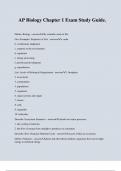
-
AP Biology Chapter 1 Exam Study Guide.
- Exam (elaborations) • 5 pages • 2024
- Available in package deal
-
- $10.49
- + learn more
AP Biology Chapter 1 Exam Study Guide. Define: Biology - answerthe scientific study of life Give Examples: Properties of Life - answera. order b. evolutionary adaptation c. response to the environment d. regulation e. energy processing f. growth and development g. reproduction List: Levels of Biological Organization - answer1. biosphere 2. ecosystems 3. communities 4. populations 5. organisms 6. organ systems and organs 7. tissues 8. cells 9. organelles 10. molecules Describe:...
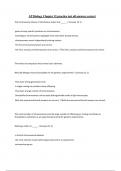
-
AP Biology Chapter 15 practice test all answers correct
- Exam (elaborations) • 19 pages • 2024
-
Available in package deal
-
- $9.49
- + learn more
AP Biology Chapter 15 practice test all answers correct The chromosome theory of inheritance states that _____. ( Concept 15.1) genes occupy specific positions on chromosomes homologous chromosomes segregate from each other during meiosis chromosomes assort independently during meiosis The first and second answers are correct. The first, second, and third answers are correct. The first, second, and third answers are correct. The theory encompasses these three basic elements. Why ...
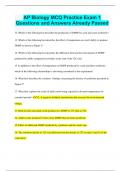
-
AP Biology MCQ Practice Exam 1 Questions and Answers Already Passed
- Exam (elaborations) • 12 pages • 2024
- Available in package deal
-
- $9.99
- + learn more
AP Biology MCQ Practice Exam 1 Questions and Answers Already Passed 12. Which of the follwing best describes the production of DMSP by coral and coral symbionts? 13. Which of the following best describes the effect of temperature on corals' ability to produce DMSP as shown in Figure 1? 14. Which of the following best describes the difference between the total amount of DSMP produced by adults compared to juveniles at the start of the 32C trial. 15. In addition to the effect of temperat...
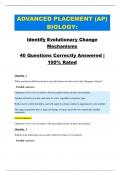
-
ADVANCED PLACEMENT (AP) BIOLOGY: Identify Evolutionary Change Mechanisms 40 Questions Correctly Answered | 100% Rated
- Exam (elaborations) • 18 pages • 2023
-
Available in package deal
-
- $8.00
- + learn more
ADVANCED PLACEMENT (AP) BIOLOGY: Identify Evolutionary Change Mechanisms 40 Questions Correctly Answered | 100% Rated Question 1 What conclusion did Darwin draw from the finches he observed at the Galapagos Islands? Possible Answers: Organisms will evolve in order to fill unoccupied niches in their environment. Finches will all live in the same area of a tree, regardless of species type. Birds reserve a herd mentality, and will aspire to remain similar in appearance to one another...
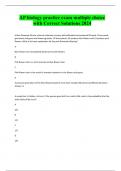
-
AP biology practice exam multiple choice with Correct Solutions 2024
- Exam (elaborations) • 27 pages • 2024
-
- $11.49
- + learn more
AP biology practice exam multiple choice with Correct Solutions 2024 A blue-flowered African violet of unknown ancestry self-pollinated and produced 50 seeds. These seeds germinate and grow into flowering plants. Of these plants, 36 produce blue flowers and 14 produce pink flowers. What is the best explanation for the pink-flowered offspring? A Blue flowers are incompletely dominant to pink flowers. B Pink flower color is a trait recessive to blue flower color. C Pink flower color is t...
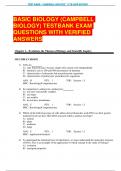
-
BASIC BIOLOGY (CAMPBELL BIOLOGY) TESTBANK EXAM QUESTIONS WITH VERIFIED ANSWER
- Exam (elaborations) • 13 pages • 2023
-
- $12.49
- + learn more
BASIC BIOLOGY (CAMPBELL BIOLOGY) TESTBANK EXAM QUESTIONS WITH VERIFIED ANSWERS Chapter 1—Evolution, the Themes of Biology, and Scientific Inquiry MULTIPLE CHOICE 1) Cells are . A) only found in pairs, because single cells cannot exist independently B) limited in size to 200 and 500 micrometers in diameter C) characteristic of eukaryotic but not prokaryotic organisms D) characteristic of prokaryotic and eukaryotic organisms ANS: D PTS: 1 TOP: Section 1.1 MSC: Knowledge/Comprehens...

-
Test-Bank - Campbell Biology in Focus, 11th AP® Edition (Urry, 2017) Chapter 1-43 | All Chapters 2023 Test Bank Campbell Biology, 11e (Urry) Chapter 1 Evolution, the Themes of Biology, and Scientific Inquiry 1.1 Multiple-Choice Questions 1) Cells are . A
- Exam (elaborations) • 1244 pages • 2023
-
- $10.99
- + learn more
Test-Bank - Campbell Biology in Focus, 11th AP® Edition (Urry, 2017) Chapter 1-43 | All Chapters 2023 Test Bank Campbell Biology, 11e (Urry) Chapter 1 Evolution, the Themes of Biology, and Scientific Inquiry 1.1 Multiple-Choice Questions 1) Cells are . A) only found in pairs, because single cells cannot exist independently B) limited in size to 200 and 500 micrometers in diameter C) characteristic of eukaryotic but not prokaryotic organisms D) characteristic of prokaryotic and eukary...
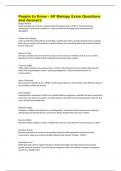
-
People to Know - AP Biology Exam Questions and Answers
- Exam (elaborations) • 2 pages • 2024
-
- $9.59
- + learn more
People to Know - AP Biology Exam Questions and Answers Gregor Mendel Monk who grew up in Austria, experimented with garden peas in 1857 to study inheritance, documented "particulate mechanism", came up with laws of independent assortment and segregation. Thomas Hunt Morgan Came up with first solid evidence associating a specific gene with a specific chromosome by working with various varieties of Drosophila; invented notation for symbolizing alleles; discovered sex-linked trait of whit...

-
Test-Bank - Campbell Biology in Focus, 11th AP® Edition (Urry, 2017) Chapter 1-43 | All Chapters 2023 Test Bank Campbell Biology, 11e (Urry) Chapter 1 Evolution, the Themes of Biology, and Scientific Inquiry 1.1 Multiple-Choice Questions
- Exam (elaborations) • 1244 pages • 2023
-
Available in package deal
-
- $10.19
- + learn more
Test-Bank - Campbell Biology in Focus, 11th AP® Edition (Urry, 2017) Chapter 1-43 | All Chapters 2023 Test Bank Campbell Biology, 11e (Urry) Chapter 1 Evolution, the Themes of Biology, and Scientific Inquiry 1.1 Multiple-Choice Questions 1) Cells are . A) only found in pairs, because single cells cannot exist independently B) limited in size to 200 and 500 micrometers in diameter C) characteristic of eukaryotic but not prokaryotic organisms D) characteristic of prokaryotic and eukaryo...
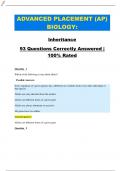
-
ADVANCED PLACEMENT (AP) BIOLOGY: INHERITANCE 93 QUESTIONS CORRECTLY ANSWERED | 100% RATED
- Exam (elaborations) • 43 pages • 2024
-
Available in package deal
-
- $10.00
- + learn more
Which of the following is true about alleles? Possible Answers: Every organism of a given species has a different set of alleles from every other individual of that species Alleles are only inherited from the mother Alleles are different forms of a given gene Alleles are always dominant or recessive All genes have two alleles Correct answer: Alleles are different forms of a given gene Question 2 EXAM In this pedigree, affected individuals have a disease causing the inability to walk forward, ...

Study stress? For sellers on Stuvia, these are actually golden times. KA-CHING! Earn from your study resources too and start uploading now. Discover all about earning on Stuvia


